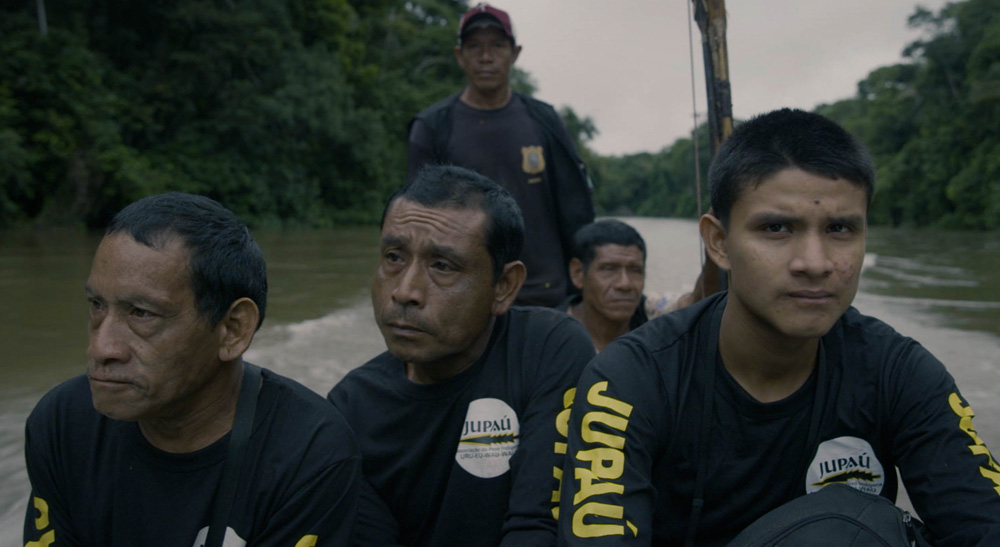Fremont, CA – January 21, 2022 – Blackmagic Design today announced that more than 40 projects at the 2022 Sundance Film Festival were created using its digital film cameras, DaVinci Resolve Studio editing, grading, visual effects (VFX) and audio post production software, and more.
Blackmagic Design congratulates the many distinguished films, episodic series and projects that were chosen as part of Sundance’s 2022 lineup, including immersive documentary “32 Sounds,” which used a Blackmagic URSA Mini Pro 4.6K digital film camera for select shots and was graded with DaVinci Resolve Studio; “892,” which captured security camera footage with a Blackmagic Pocket Cinema Camera 6K digital film camera and used DaVinci Resolve Studio for grading and on set work; and “The Exiles,” which was partially shot with an URSA Mini Pro 4.6K and graded with DaVinci Resolve Studio.
Virtual reality (VR) project “Diagnosia” relied on DaVinci Resolve Studio for editing, and many of the festival’s films also used the software for post production, including “Call Jane,” “Emily the Criminal,” “Master,” “Resurrection,” “Sharp Stick” and “When You Finish Saving the World.”
“I’m thrilled with the excellent results from DaVinci Resolve Studio,” said “Brainwashed: Sex-Camera-Power” Director Nina Menkes. “Our film was extremely complex, containing over 175 film clips with different formats, resolutions, and a variety of other technical issues we were dealing with. The technology of DaVinci Resolve Studio, along with the genius of our colorist Mike Sowa, gave us a stunning result.”
Some of the Sundance Projects that Used Blackmagic Design Cameras and Gear During Production:
- “32 Sounds” additional cinematographer Shane Thomas McMillan used URSA Mini Pro 4.6K for select shots;
- “892” DP Doug Emmett used a Pocket Cinema Camera 6K for security camera footage, while DIT Michael Borenstein used DaVinci Resolve Studio to grade dailies;
- “Emily the Criminal” DP Jeff Bierman used DaVinci Resolve Studio on set for grading select shots;
- “The Exiles” Director Ben Klein used an URSA Mini Pro 4.6K for select shots;
- “God’s Country” DP Andrew Wheeler used DaVinci Resolve Studio and a DaVinci Resolve Mini Panel to grade select frames on set;
- “Stranger Than Rotterdam” DP Ben Klein used a Pocket Cinema Camera 6K; and
- “TikTok, Boom.” DP Steve Acevedo used URSA Mini Pro 4.6K G2 and URSA Mini Pro 4.6K cameras.
 EVERY DAY IN KAIMUK!
EVERY DAY IN KAIMUK!
According to “TikTok, Boom.” documentary DP Steve Acevedo, “In addition to the many interviews, we also shot a lot of verité with minimal crew, so we needed a versatile camera for our fast pace. The URSA Mini Pro was perfect, as it goes from sticks to hand held instantly, delivers an incredible image, and is so easy to use.”
Some of the Sundance Projects that Used Blackmagic Design Gear for VFX and Editing:
- “892” Editor Chris Witt used an UltraStudio Monitor 3G as part of the editing workflow;
- “Diagnosia” Lead Artists Mengtai Zhang and Lemon Guo used DaVinci Resolve Studio to edit archival videos used in the project, as well as to edit the trailer and the walkthrough video, and an Intensity Pro 4K capture and playback device for screen recording;
- “Jihad Rehab” Editor Evan Vetter used a Blackmagic Web Presenter streaming solution to work remotely with the director during editorial;
- “A Love Song” Colorist Ernie Schaeffer of Splendor Omnia used DaVinci Resolve Studio’s Fusion page for VFX clean up;
- “Neptune Frost” Assistant Editor Skylar Zhang used DaVinci Resolve to create dailies as part of the editing pipeline;
- “Resurrection” VFX Supervisor Alex Noble of Wild Union Post used DaVinci Resolve Studio within his VFX pipeline; and
- “Something In The Dirt” Directors Aaron Moorhead and Justin Benson and Editor Michael Felker used DeckLink 8K Pro capture cards.
 DIAGNOSIA
DIAGNOSIA
Some of the Sundance Projects that Used DaVinci Resolve and DaVinci Resolve Studio for Grading:
- “2nd Chance” was graded by Jane Tolmachyov of Goldcrest;
- “32 Sounds” was graded by Natacha Ikoli of Nice Dissolve, with DI Supervisor Pierce Varous also using DaVinci Resolve Mini Panel, DaVinci Resolve Micro Panel, DaVinci Resolve Speed Editor, Smart Videohub 20×20 router, UltraStudio 4K, DeckLink SDI 4K and Mini Converter SDI to HDMI 6G throughout the post production pipeline;
- “892” was graded by Natasha Leonnet of Company 3;
- “After Yang” was graded by Joe Gawler of HARBOR;
- “blood” was graded by Roman Hankewycz of HARBOR;
- “Brainwashed: Sex-Camera-Power” was graded by Mike Sowa of FotoKem;
- “Bring on the Dancing Horses” was graded by Bruce Bolden of Sugar Studios LA with a DaVinci Resolve Advanced Panel;
- “Call Jane” was graded by Nat Jencks of PostWorks New York;
- “The Cathedral” was graded by Steve Beganyi of Goldcrest;
- “Cha Real Smooth” was graded by Nat Jencks of PostWorks New York;
- “Champ” was graded by Luke Cahill of Lightwave Post;
- “Chiqui” was graded by Robert Wagnerman of Haym Pictures;
- “DOWNFALL: The Case Against Boeing” was graded by Luke Cahill of Different By Design;
- “Emily the Criminal” was graded by Walter Volpatto of Company 3;
- “Every Day in Kaimukī” was graded by Abraham Williams with a DaVinci Resolve Mini Panel;
- “The Exiles” was graded by Samuel Gursky of Irving Harvey;
- “Framing Agnes” was graded by Arlene Moelker of Picture Shop Toronto;
- “Girl Picture” was graded, online edited and finished by Petri Falkenberg of Grade One;
- “Honk for Jesus, Save Your Soul” was graded by Billy Gabor of Company 3;
- “A House Made of Splinters” was graded, online edited and finished by Anders Vadgaard Christensen of Kong Gulerod Film ApS;
- “I Didn’t See You There” was graded by Natacha Ikoli of Nice Dissolve, with DI Supervisor Pierce Varous also using DaVinci Resolve Mini Panel, DaVinci Resolve Micro Panel, DaVinci Resolve Speed Editor, Smart Videohub 20×20, UltraStudio 4K, DeckLink SDI 4K and Mini Converter SDI to HDMI 6G throughout the post production pipeline;
- “The Janes” was graded by Ken Sirulnick of Goldcrest;
- “Jihad Rehab” was graded by Luke Cahill of Different By Design;
- “Leonor Will Never Die” was graded by Timmy Torres;
- “Living” was graded by Joseph Bicknell of Company 3;
- “A Love Song” was graded by Ernie Schaeffer of Splendor Omnia;
- “Master” was graded by Sam Daley of Light Iron;
- “Mija” was graded by Kath Raisch of Company 3;
- “My Old School” was graded by Jon Bruce, and online edited and finished by Lewis Carmichael, both of Blazing Griffin Post Production;
- “My Trip to Spain” was graded by Ryan McNeal of RKM Studios;
- “Resurrection” was graded by Nat Jencks of PostWorks New York;
- “Sharp Stick” was graded by Nat Jencks of PostWorks New York;
- “Sirens” was graded by Maria Carretero of Nice Shoes;
- “Something In The Dirt” was graded by Aaron Moorhead;
- “Stranger Than Rotterdam” was graded by Samuel Gursky of Irving Harvey;
- “The Territory” was graded by Seth Ricart of RCO;
- “TikTok, Boom.” was graded by Zachary Ludescher with a DaVinci Resolve Mini Panel, using a DeckLink Mini Monitor 4K for 4K monitoring;
- “Watcher” was graded by Stephen Nakamura of Company 3;
- “When You Finish Saving the World” was graded by Joe Gawler of HARBOR; and
- “You Won’t Be Alone” was graded by Marty Pepper of Kojo.
“It’s exciting to have four films at Sundance this year with radically different styles. Working with many longtime collaborators and some new ones, the work done in preproduction to build the looks and create LUTs, which were used during shooting, was critical to setting us up with a great starting point for all the remote work we did when we eventually hit the DI,” said Colorist Nat Jencks of PostWorks New York. “Working with our custom color pipeline in DaVinci Resolve Studio let me seamlessly and accurately change our target deliverable from P3 theatrical to Rec.709 streaming when the festival changed plans at the 11th hour, so we never had to slow down or regrade; we just changed targets.”
 THE TERRITORY
THE TERRITORY
About Blackmagic Design
Blackmagic Design creates the world’s highest quality video editing products, digital film cameras, color correctors, video converters, video monitoring, routers, live production switchers, disk recorders, waveform monitors and real time film scanners for the feature film, post production and television broadcast industries. Blackmagic Design’s DeckLink capture cards launched a revolution in quality and affordability in post production, while the company’s Emmy™ award winning DaVinci color correction products have dominated the television and film industry since 1984. Blackmagic Design continues ground breaking innovations including 6G-SDI and 12G-SDI products and stereoscopic 3D and Ultra HD workflows. Founded by world leading post production editors and engineers, Blackmagic Design has offices in the USA, UK, Japan, Singapore and Australia. For more information, please go to www.blackmagicdesign.com






